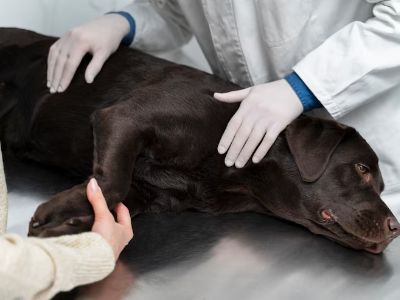If you are a dog owner in the UK, you may want to pay attention to this warning. A potentially fatal disease called lungworm is spreading across the country. This disease could affect your furry friend and cause some serious issues for them.
What is Lungworm?
Lungworm is a parasite that can infect dogs and other animals. It is carried by slugs and snails, which can be eaten by dogs or contaminate their toys, bowls or grass. The parasite then travels to the lungs, heart and blood vessels of the infected animal, causing serious health issues.
What Are The Symptoms Of Lungworm?

Lungworm can cause a variety of symptoms in dogs, such as:
- Coughing
- Changes in breathing or difficulty breathing
- Loss of appetite
- Vomiting and diarrhoea
- Weight loss
- Lethargy
- Unexplained or excessive bruising
- Pale gums
- Bleeding
Some of these symptoms are often mistaken for other conditions, so it is important to consult your vet if you notice any changes in your dog’s behaviour.
How Serious Is Lungworm?
Lungworm is a serious disease and even fatal if left untreated. According to an interactive map that tracks registered cases of lungworm, there have been 2,762 confirmed cases across the UK, however, many are still unreported. The South-East of the country is the worst hit, with around 1,400 cases in and around London alone. But, the disease has also been detected in northern regions of England and Scotland, which were not previously considered at risk.
Also, 9% of dogs that get infected with lungworm die from the complications that it causes. Lungworm can damage the lungs, heart and blood vessels of the dog, leading to bleeding disorders, heart failure and respiratory distress.
How Can I Prevent Lungworm?
The good news is that lungworm can be prevented and treated with regular worming treatments. You should consult your vet about the best worming product for your dog, as not all of them are effective against lungworms.
You can also take some simple steps to reduce the risk of exposure to lungworm:
- Picking up your dog’s faeces quickly. This will help prevent the spread of lungworm larvae in the environment.
- Removing toys and bowls from the garden overnight. This ensures that they are not exposed to slugs and snails.
- Frequently changing the water in water bowls.
- Try avoiding areas where slugs and snails are common or where lungworm cases have been reported.
What Should I Do If I Suspect My Dog Has Lungworm?
If you think your dog may have lungworm, you must take them to the vet as soon as possible. The vet will diagnose lungworm by testing a blood or faecal sample from your dog. The treatment for lungworm normally involves a course of worming medication that kills the parasite and prevents further infection.
The sooner you detect and treat lungworm, the better the chances of recovery for your dog. So don’t delay and act today!
References
1: Vets issue warning as potentially fatal dog disease lungworm spreads throughout the UK
2: Dog owners warned as fatal pet disease spreads across UK, with cases in Warrington
3: Shropshire dog owners warned as fatal disease spreads in UK
4: Dog owners warned about a potentially fatal disease which is spreading throughout the UK



